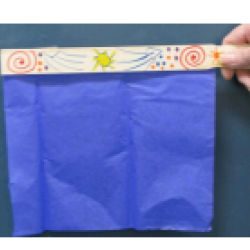Source Institutions
Source Institutions
Add to list Go to activity
Activity link broken? See if it's at the internet archive

In this two part activity, learners become draft detectives by constructing their own draft catchers to detect drafts around windows or doors. Next, they make draft stoppers to reduce air flow and conserve energy. This activity helps learners understand the importance of reducing drafts and preventing heat or cold air loss. Note: the second part of this activity requires the use of a sewing machine (not included in cost of materials).
- Under 5 minutes
- 10 to 30 minutes
- $5 - $10 per student
- Ages 4 - 14
- Activity, Lesson/Lesson Plan
- English
Quick Guide
Materials List (per student)
- 1 paint stirrer (a pencil, popsicle stick or skewer may be also be used)
- 1 piece of tissue paper
- Tape, glue stick or other adhesive
- Markers, for decoration
- 2 pieces of fabric, 6 x 38 inches
- Sewing machine with thread
- Dry lentils or rice for filling
- A small scooper or funnel for filling
- Wiggly eyes, fabric glue and other fun items to use to decorate
Subjects
-
Engineering and Technology
-
Engineering
- Architectural Engineering
- Civil Engineering
- Environmental Engineering
- Metallurgy and Materials Engineering
-
Technology
- Construction
-
Engineering
-
Physical Sciences
-
Heat and Thermodynamics
- Heat and Temperature
- Heat Transfer
-
Energy
- Energy and Power
-
States of Matter
- Gases
-
Heat and Thermodynamics
-
The Nature of Technology
-
Technology and Society
- Technology and the Environment
-
The Design Process
- Invention and Innovation
- Problem Solving
- Troubleshooting and Maintenance
-
Technology and Society
Informal Categories
- Arts and Crafts
- Nature and Environment
Audience
To use this activity, learners need to:
- see
- touch
Learning styles supported:
- Uses STEM to solve real-world problems
- Involves hands-on or lab activities
Other
This resource is part of:
Access Rights:
- Free access
By:
Rights:
- All rights reserved, Sciencenter, 2010
Funding Source:
- Institute of Museum and Library Services
